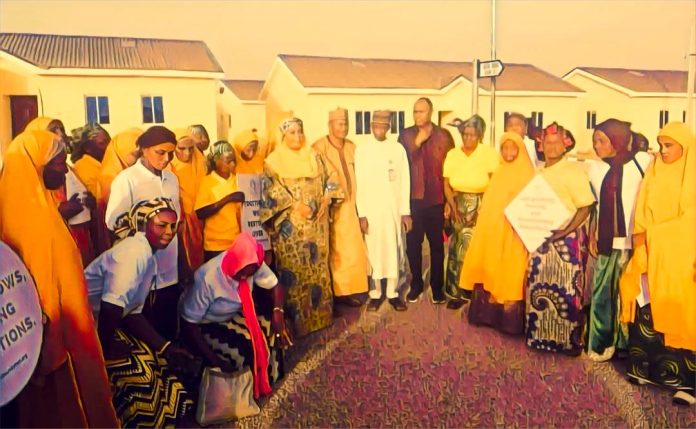KEY POINTS
- The Adashe housing project provides safe homes for widows.
- Training programs within the Adashe housing project foster self-reliance.
- Plans are underway to expand the Adashe housing project nationwide.
This week, numerous widows and orphans in Kaduna acquired newly constructed homes, marking a significant achievement for the Adache Women Housing and Empowerment Society’s free housing effort. The organization distributed keys and allocation letters for 100 units in Rigachikun, Igabi Local Government Area, providing recipients with housing and a restored sense of stability.
Adashe housing project changes lives
The initiative originates from Dr. Umma Sani, the CEO of Adashe Women Housing and Empowerment Society, who drew inspiration from her own childhood adversities. As the youngest of eleven siblings, Sani experienced the loss of her father at the age of one and endured persistent instability, frequently returning home from school to discover the family’s belongings placed on the street due to unpaid rent. She characterized those events as pivotal, fostering a lifelong aspiration to offer secure housing for individuals encountering analogous difficulties.
Sani stated, “The most significant challenge my family encountered during my upbringing was housing.” “Frequently, our possessions were discarded outside, and the residence was secured due to our inability to pay rent.” Today, 100 women have received not merely a residence, but also refuge, tranquility, and a harmonious setting to nurture their children.
Empowerment through Adashe housing project
The Kaduna project serves as the initial phase of a comprehensive strategy to extend the program throughout Nigeria’s 36 states. Dr. Sani affirmed that such developments are scheduled for Ibadan and Calabar. The initiative in Kaduna was implemented in collaboration with Family Homes Funds Limited and the Federal Ministry of Budget and Economic Planning, in accordance with President Bola Tinubu’s Renewed Hope Agenda for social housing.
According to The Guardian, Dr. Sani underscored that the housing initiative transcends mere provision of physical shelter. Beneficiaries received starter packs and educational resources intended to facilitate their self-sufficiency. Training sessions occurred prior to the handover, during which she commended the dedication and fervor exhibited by the participants.
Sani stated, “This is not merely a charitable endeavor; it represents a route to dignity and stability.” “We offer housing, but we also equip women with the resources to achieve independence.” Today, they have concluded their training and received their keys and allocation letters. Today is fantastic for everyone.



